
Hãy nhập câu hỏi của bạn vào đây, nếu là tài khoản VIP, bạn sẽ được ưu tiên trả lời.


10: I wish today is a holiday
11: I wish I can sing this song
13: I wish they will come here again
14: I wish he will go swimming with me

Đáp án:
FRIDAY | SATURDAY |
Sewing class 1. 6 - 8 p.m. | 4. cycling competition 9- 11 a.m. |
2. English club 5-7 p.m. | |
School talent show 3. 7.30 - 9 p.m. | Action movie 5. 8.30 - 10 p.m. |
Hướng dẫn dịch:
thứ Sáu | thứ Bảy |
Lớp may vá 6 - 8 giờ tối | Cuộc thi đạp xe 9 – 11 giờ sáng |
Câu lạc bộ Tiếng Anh 5 – 7 giờ tối | |
Buổi diễn tài năng trường học 7:30 – 9 giờ tối | Phim hành động 8:30 – 10 giờ tối |

Hướng dẫn dịch:
Kỹ năng hội thoại
Không đồng ý một cách lịch sự
Để không đồng ý một cách lịch sự, hãy nói
· That's true, but... (Điều đó đúng, nhưng…)
· Yes, but... (Đúng vậy, nhưng…)
· Really? (I...) (Thật á?)

Before:
Build an emergency kit and make a family communications plan.
Avoid building in a floodplain unless you elevate and reinforce your home.
Elevate the furnace, water heater and electric panel in your home if you live in an area that has a high flood risk.
Consider installing "check valves" to prevent flood water from backing up into the drains of your home.
If feasible, construct barriers to stop floodwater from entering the building and seal walls in basements with waterproofing compounds.
During:
Listen to the radio or television for information.
Be aware that flash flooding can occur. If there is any possibility of a flash flood, move immediately to higher ground. Do not wait for instructions to move.
Be aware of stream, drainage channels, canyons and other areas known to flood suddenly. Flash floods can occur in these areas with or without typical warnings such as rain clouds or heavy rain.
After:
Avoid moving water.
Stay away from damaged areas unless your assistance has been specifically requested by police, fire, or relief organization.
Emergency workers will be assisting people in flooded areas. You can help them by staying off the roads and out of the way.
Play it safe. Additional flooding or flash floods can occur. Listen for local warnings and information. If your car stalls in rapidly rising waters, get out immediately and climb to higher ground.
Return home only when authorities indicate it is safe.
Before:
- Build an emergency kit and make a family communications plan.
- Avoid building in a floodplain unless you elevate and reinforce your home.
- Elevate the furnace, water heater and electric panel in your home if you live in an area that has a high flood risk.
- Consider installing "check valves" to prevent flood water from backing up into the drains of your home.
- If feasible, construct barriers to stop floodwater from entering the building and seal walls in basements with waterproofing compounds.
During:
- Listen to the radio or television for information.
- Be aware that flash flooding can occur. If there is any possibility of a flash flood, move immediately to higher ground. Do not wait for instructions to move.
- Be aware of stream, drainage channels, canyons and other areas known to flood suddenly. Flash floods can occur in these areas with or without typical warnings such as rain clouds or heavy rain.
After:
- Avoid moving water.
- Stay away from damaged areas unless your assistance has been specifically requested by police, fire, or relief organization.
- Emergency workers will be assisting people in flooded areas. You can help them by staying off the roads and out of the way.
- Play it safe. Additional flooding or flash floods can occur. Listen for local warnings and information. If your car stalls in rapidly rising waters, get out immediately and climb to higher ground.
- Return home only when authorities indicate it is safe.

Đáp án:
A: There is too much noise here!
B: This store has a lot of snacks, but I don't have enough money.
Hướng dẫn dịch:
A: Có quá nhiều tiếng ồn ở đây!
B: Cửa hàng này có rất nhiều đồ ăn vặt, nhưng tôi không có đủ tiền.
Hướng dẫn dịch đề bài:
Lượng từ với danh từ đếm được/ không đếm được
Chúng ta có thể sử dụng các danh từ đếm được/không đếm được với các từ định lượng: lot of/a lot of, too much, too many, và not enough để nói về số lượng.
- lot of/a lot of... có nghĩa là một lượng lớn cái gì đó.
- ….are too many... có nghĩa là số lượng của một thứ gì đó có thể đếm được nhiều hơn bạn muốn.
- ....is too much... có nghĩa là số lượng của một thứ gì đó không đếm được nhiều hơn bạn muốn.
- .... not enough... có nghĩa là số tiền ít hơn bạn muốn.
Lưu ý: too much, too many, và not enough có nghĩa tiêu cực.
There are lots of people.(Có rất nhiều người.)
There is too much work to do.(Có quá nhiều việc phải làm.)
There are too many cars on the road.(Có quá nhiều xe trên đường.)
There isn't enough time to play. (Không có đủ thời gian để chơi.)

Hi Tom,
I hope this email finds you well. I wanted to share an exciting opportunity with you – the upcoming Ok Om Bok Festival! It's a vibrant and culturally rich event that celebrates the traditional harvest season.
Participating in the festival will give you a chance to immerse yourself in the local culture, witness mesmerizing rituals, and enjoy delicious traditional foods. The festival's colorful atmosphere and warm community spirit make it a unique experience.
Don't miss out on this fantastic cultural celebration! Your presence would undoubtedly add to the festive cheer. Looking forward to seeing you there!
Best regards,
Xuan Thanh
Dear Tom,
I'm happy to hear that you are going to join the Ok Om Bok Festival in Soc Trang Province. As I know, Ok Om Bok Festival, also called Moon Offering Festival is traditional folk festival has existed for a very long time of Khmer people in Mekong Delta, especially 2 Tra Vinh and Soc Trang Provinces.
Here, I have some advice for you to dos and don'ts at that festival. First, I think you should wear trainer or shoes and comfortable clothes because maybe you must be walk a lot. And then, remember to bring some bottle of water, it will be hot in Soc Trang so you will get thirsty.
Also, I should remind you that you must not to litter on the ground or run away from your father. It's an big festival so it will be crowded, you should be careful to not get lost. Anyway, I hope you will have a great time with your dad and enjoy the festival.
Cheers
Đáp án:
1. room | 2. nature | 3. peace | 4. fresh |
5. fresh | 6. vehicle | 7. entertainment | 8. facility |
Hướng dẫn dịch:
giải trí - những thứ mọi người có thể làm để vui vẻ
tự nhiên - động vật, thực vật và những thứ không làm ra từ con người
tiếng ồn - âm thanh khó chịu hoặc lớn
bình yên - trạng thái bình tính hoặc lặng yên
tươi - sạch hoặc mát (ví dụ: nước, không khí)
xe cộ - một thứ được sử dụng để vận chuyển người hoặc vật từ nơi này sang nơi khác, chẳng hạn như ô tô hoặc xe tải
phòng - có sẵn không gian trống để sử dụng
trang thiết bị - một tòa nhà, dịch vụ, thiết bị, v.v. với một mục đích cụ thể
1. Tôi muốn có một khu vườn lớn vì tôi cần chỗ để trồng rau.
2. Nhiều người đến thăm Hawaii vì tự nhiên của nó. Nó có rất nhiều bãi biển và núi đẹp với cây cối và các loài chim đầy màu sắc.
3. Điều tôi thích nhất về thư viện không phải là sách. Đó là yên bình và yên tĩnh.
4. Không khí bên ngoài thật trong lành. Chúng ta hãy đi dạo!
5. Tôi sống gần sân bay, và tôi không thể ngủ vào ban đêm vì tiếng ồn quá lớn!
6. Tôi phải sử dụng phương tiện giao thông công cộng hàng ngày vì tôi không có phương tiện đi lại.
7. Công viên giải trí và nhà hát là hai ví dụ về giải trí trong thành phố của tôi.
8. Tôi nghĩ rằng bệnh viện mới là cơ sở quan trọng nhất trong thị trấn của chúng tôi.

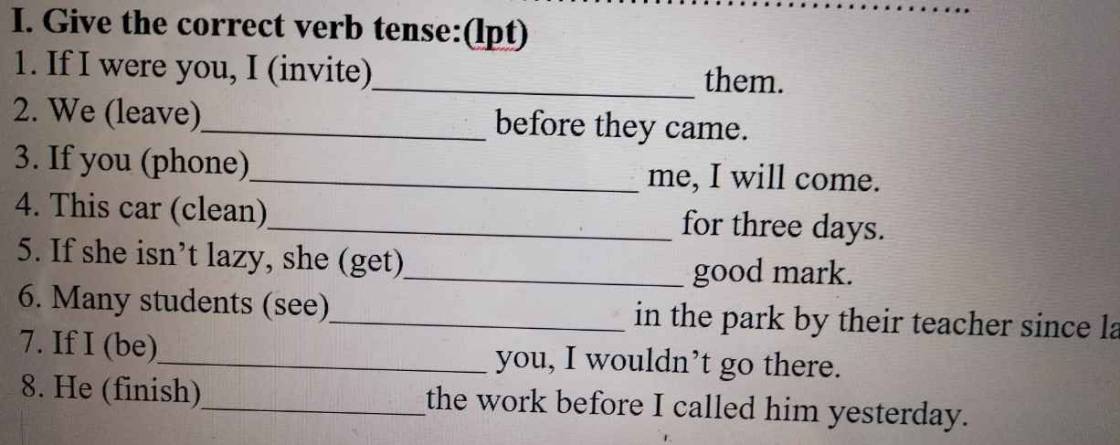
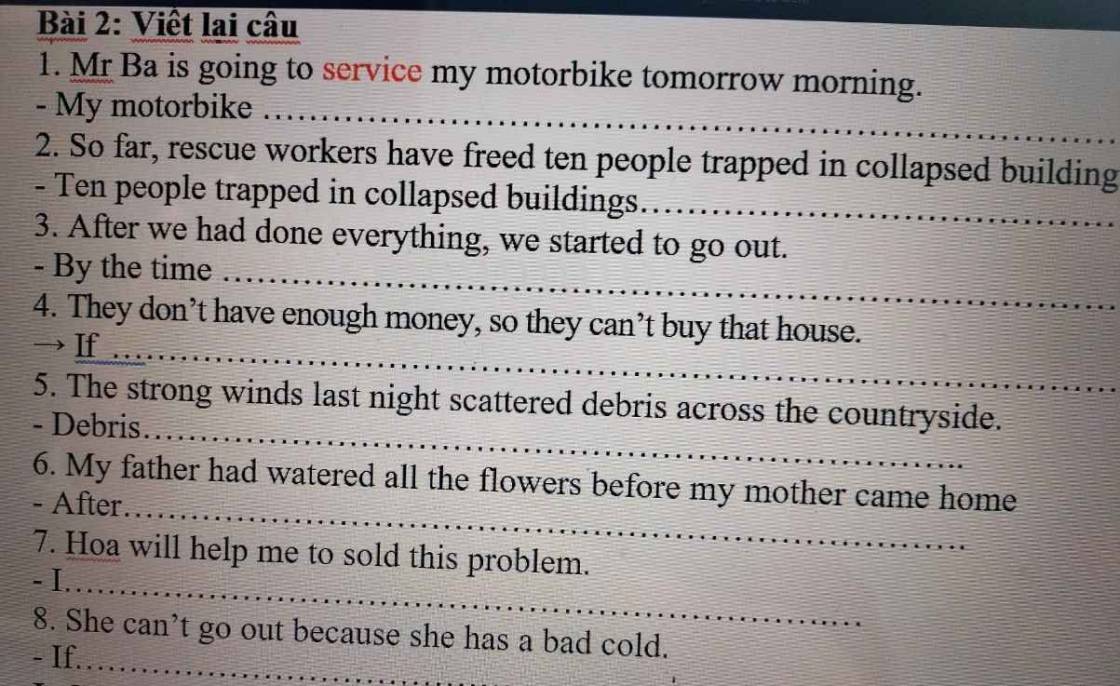
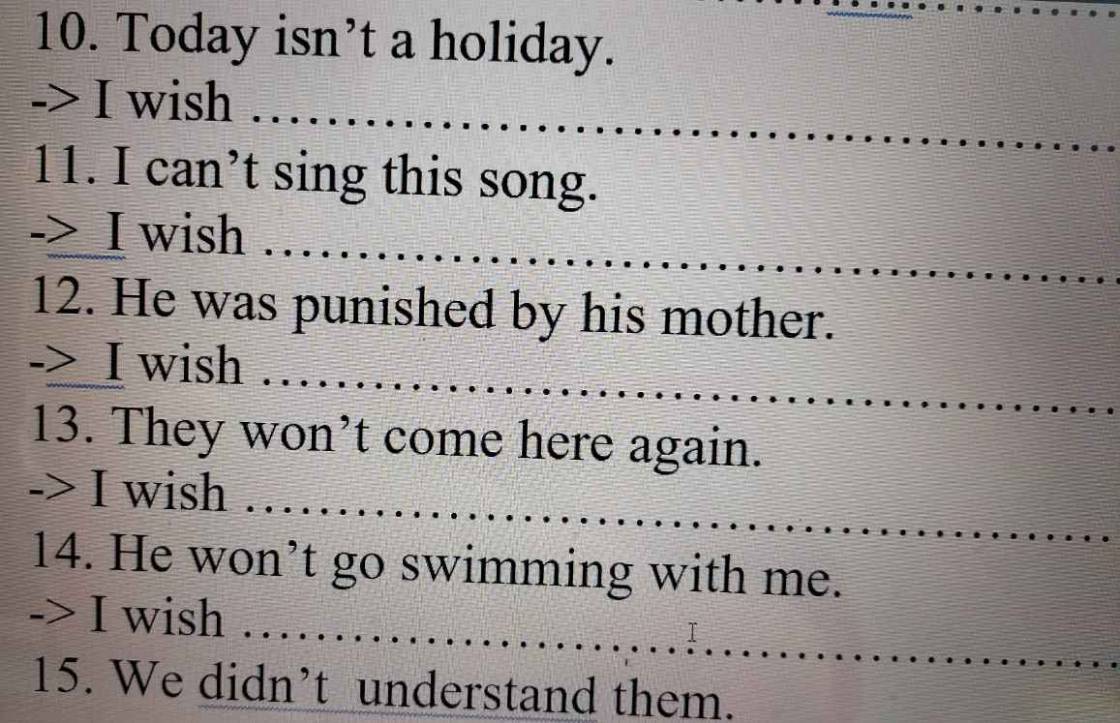
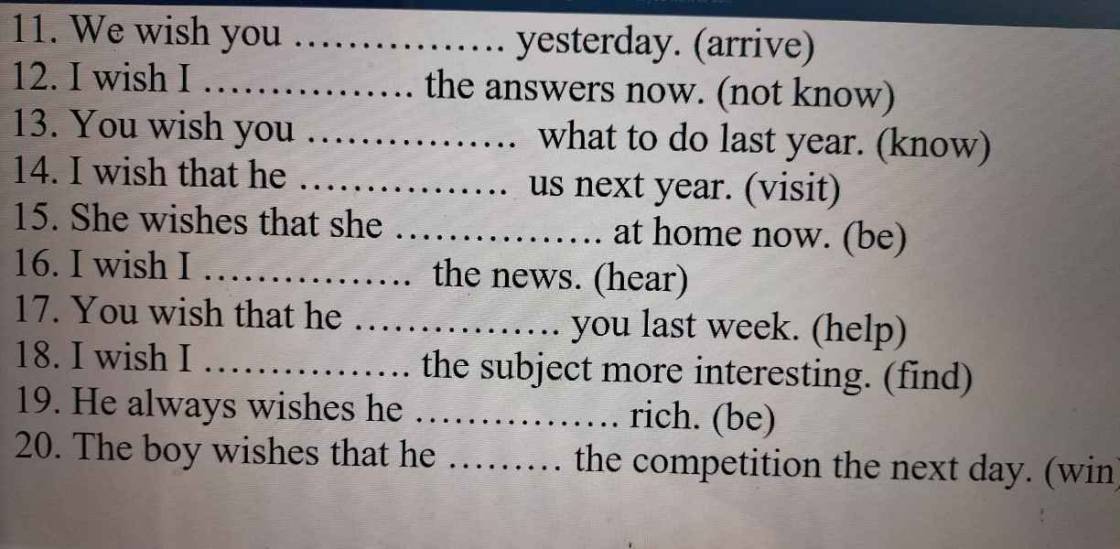


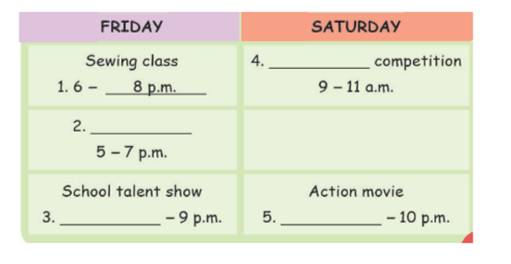

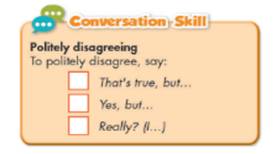
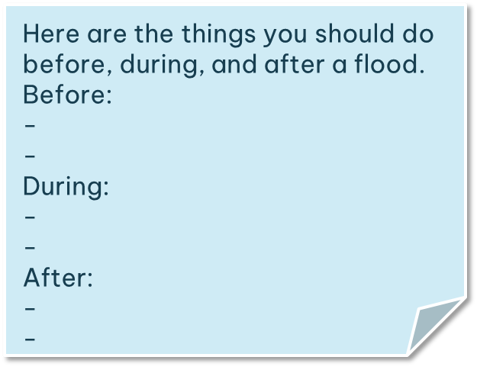
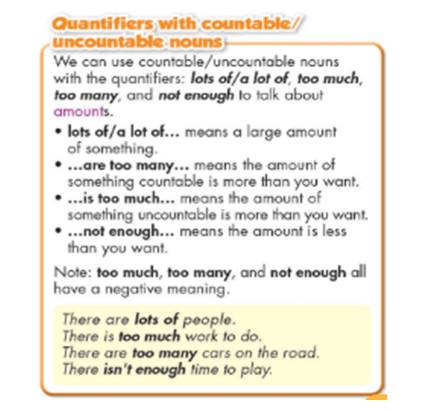
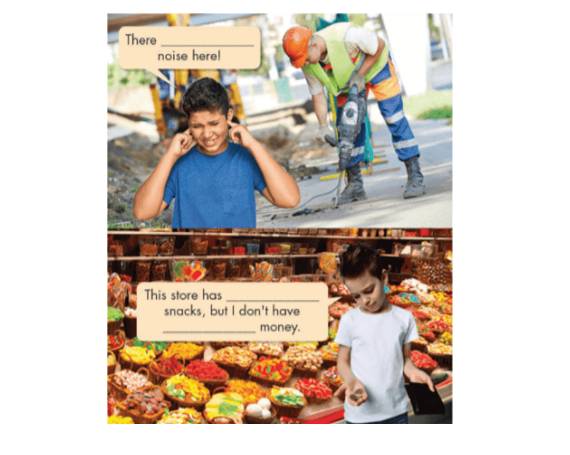
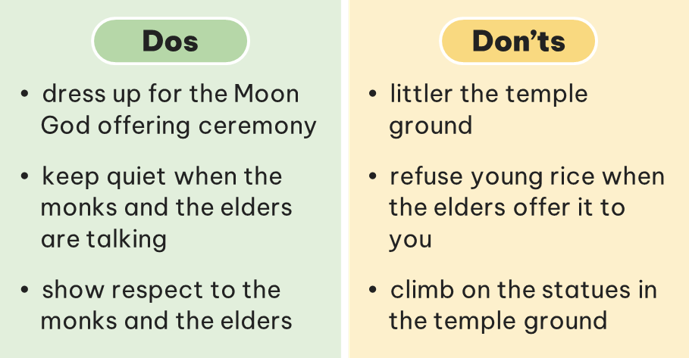
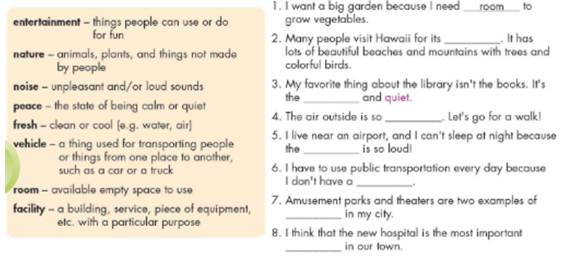
1 in->on
Dùng giới từ at hoặc on với the weekend(s)
2 would visit->would have visited
-Câu điều kiện loại 3 diễn tả điều không có thật ở quá khứ
-Cấu trúc: If+S+had PII, S+would+have PII
3 knew->known
-Quá khứ hoàn thành: S+Had+PII
4 am->were
5 can->could
-Câu điều kiện loại 2 diễn tả điều không có thật ở hiện tại hoặc tương lai
-Cấu trúc: If+S+V(ed/bất quy tắc), S+would+V(infinitive)
1. in -> on (weekend luôn đi với giới từ on)
2. would visit -> would have visited (Câu điều kiện loại 3 vì có "were" chỉ giả thiết không có thực trong quá khứ -> mệnh đề chính là thì tương lai hoàn thành trong quá khứ)
3. knew -> known (had + V(pt II): know - knew - known)
4. am - were (Giả thiết không có thực ở hiện tại, tôi không thể là bạn -> câu điều kiện loại 2, mệnh đề phụ ở thì quá khứ đơn)
5. studied -> study (Do không thể xác định giả thiết có tồn tại hay không vì anh ầy có thể đã vượt qua hoặc trượt bài thi hay là sắp thi nên không thể quy về câu điều kiện loại 2,3 -> xem giả thiết đó là tương lai -> Câu điều kiện loại 1)